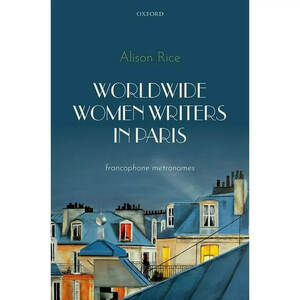 "
"
My high school exchange to Paris and visit during the summer of 2023 have taught me that the city is not a particularly welcoming place for foreigners. Nevertheless, I grew to fall in love with the distinct culture, artistry and intentionality in daily life. Despite the foreseeable challenges, I hope to return to Paris for a longer period of time and devote myself to the culture since I have developed a deep appreciation of it.
This personal connection motivated me to sit down with Professor Alison Rice, the author of “Worldwide Women Writers in Paris: Francophone Metronomes” and learn about the experiences of the women in her book who are trying to make their mark on the French literary scene.
Rice fell in love with France in college, but it was returning to the country for her post-master degree that sparked her research idea. She observed an increase in the number of foreign writers, particularly the number of women, flocking to Paris. “I was fascinated by so many women from elsewhere writing in Paris, and for whom French was not their mother tongue, it was a very interesting phenomenon that I want[ed] to look into,” said Rice.
Rice reached out and interviewed both up-and-coming and established foreign writers to learn more about this phenomenon. Rice interviewed a total of 18 women from diverse cultural backgrounds. She hoped to challenge the traditional ways of categorizing different cultures within society and study the intersectionality between women’s experiences.
“What is cool is to juxtapose these voices that have never been juxtaposed before. Normally we think ok I am going to study Asian women or Eastern European women or African women, we tend to think in these regions. I wanted to look at what happens when we put these voices together alongside each other, what unforeseen similarities do we find,” said Rice.
One common thread throughout our conversation was how the French culture regarded the French people, language and literature. The French are very protective of their culture; Paris is particularly notorious for this. Notably, the Parisian accent is complex: an idea that Rice devotes a whole chapter to. Specifically, she discusses the exclusionary practice of Parisians who only respect “perfect” French accents.
In addition to setting high standards for “perfect French” in both accent and language, the French similarly foster exclusivity in the literary scene by creating subcategories that are regarded as lesser than French literature. Rice noticed how French literature written by foreign writers was only considered worthy for the ethnographical, anthropological and sociological value that it brings from a different cultural perspective. For this reason, Rice explains that this type of literature is categorized and added to culturally specific collections such as “Literature in French Written by an African.” Rice explained that such categorical collections create a hierarchical literary scale and devalue foreign French writers for their literary writing capabilities.
The French literary exclusivity corresponds with the wider exclusivity regarding French nationality. All the writers whom Rice interviewed were proud of their origins, but it was not the only definitive feature of their identity. Many of the writers identified with being Parisian and European, but not French.
Rice is ultimately hopeful in her belief that France is heading toward a more encompassing literary culture: “Just as the French are realizing they can't control the language, they can't control the literature in that language. It's going to be rich and even multilingual sometimes. It's better to just embrace that change and evolution and also not define who has the right to write in French but rather recognize what an honor it is to read all kinds of literature in French.”
Rice has personally observed how many of the women, whom she interviewed in the early 2000s, are now recognized by prestigious publishing houses and categorized alongside other French literary masterpieces. With the growth of a new and globally influenced generation, the evolution toward a more inclusive French culture may be on the horizon. However, Rice noted that there is also a value in feeling like a foreigner since it can serve as a source of creativity. “When you never sink into a comfort zone, you’re reminded of your otherness, and so to convert that into creative expression can be really exciting,” Rice said.
I stepped away from this conversation with many insights, and I found this final quote especially intriguing since it prompted me to further think about one question: “Under what conditions can discomfort lead to creativity?”